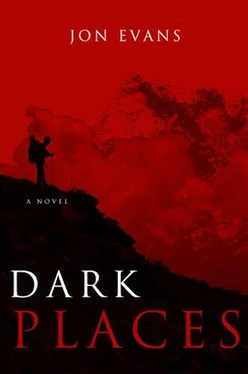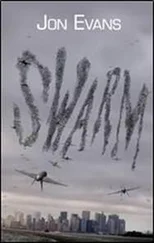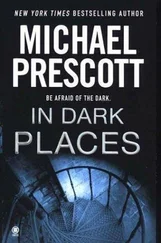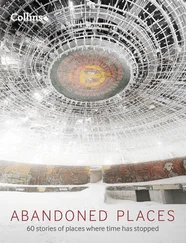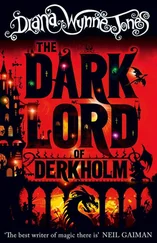Jon Evans - Dark Places
Здесь есть возможность читать онлайн «Jon Evans - Dark Places» весь текст электронной книги совершенно бесплатно (целиком полную версию без сокращений). В некоторых случаях можно слушать аудио, скачать через торрент в формате fb2 и присутствует краткое содержание. Жанр: Триллер, на английском языке. Описание произведения, (предисловие) а так же отзывы посетителей доступны на портале библиотеки ЛибКат.
- Название:Dark Places
- Автор:
- Жанр:
- Год:неизвестен
- ISBN:нет данных
- Рейтинг книги:5 / 5. Голосов: 1
-
Избранное:Добавить в избранное
- Отзывы:
-
Ваша оценка:
- 100
- 1
- 2
- 3
- 4
- 5
Dark Places: краткое содержание, описание и аннотация
Предлагаем к чтению аннотацию, описание, краткое содержание или предисловие (зависит от того, что написал сам автор книги «Dark Places»). Если вы не нашли необходимую информацию о книге — напишите в комментариях, мы постараемся отыскать её.
Dark Places — читать онлайн бесплатно полную книгу (весь текст) целиком
Ниже представлен текст книги, разбитый по страницам. Система сохранения места последней прочитанной страницы, позволяет с удобством читать онлайн бесплатно книгу «Dark Places», без необходимости каждый раз заново искать на чём Вы остановились. Поставьте закладку, и сможете в любой момент перейти на страницу, на которой закончили чтение.
Интервал:
Закладка:
Drop my pack and scramble up the slope, throw rocks down at him? Also a desperate move. And it would get me away from the trail, away from any hope of rescue.
Still trapped by fear and indecision I rounded another bend and saw the sweetest sight in the world. The leading wave of trekkers heading to Letdar. A line of trekkers as far as the eye could see, stretched out in twos and threes and fours. I had bemoaned the crowds, the hunt for spare beds, the overpopulation of the trail since the moment I had set foot on it. Now I took it all back.
A wild plan came to mind. I'd stay here, drop my pack, wait for him, pretend I was going to stand my ground. He'd get here just as the first few trekkers arrived. I'd get them to help me overcome him, and we'd drag him back to Manang, I'd come back not just with Stanley Goebel's name but with his killer as well. Drunk on the apparent brilliance of this plan, I shrugged my pack to the ground and turned to face the masked figure.
Who had already turned back. Maybe something in my body language, some physical sign of relief, had given it away. Maybe it wasn't even the killer after all, merely a trekker with sensitive skin out for his morning walk who had just remembered that he had forgotten his pack — although that didn't seem likely. But by the time the first trekkers reached me, he was out of sight. I considered going after him, trying to deputize the newcomers into helping me catch him, but concluded that they would just think altitude sickness had driven me mad. Besides, we weren't going to catch him, he had sneakers on and no pack.
It took me three attempts to put my pack back on because I was shaking violently with fear and adrenaline. I took my hat off and mopped at the sweat on my face and began to walk weakly down the trail. Trekkers nodded and said hi to me as they passed. They probably thought I was going back down because I was sick. I looked sick. I felt sick, sick and overwhelmingly relieved. I'd only been afraid in that way once before, in Africa, when I was sleeping outside and hyenas approached our camp. The raw primal fear of being prey.
I walked very fast down the trail, past the endless knots of trekkers, thinking furiously. My first theory was wrong, he hadn't gone to Manang. I wondered why. He could have been far away from the scene of the crime by now, but he went to Letdar instead. Maybe he just wanted to finish the trek, to go over the Thorung La. Maybe he was a traveler just like anyone else here, with a side order of homicidal mania.
I knew roughly where he was now. Which didn't really help. I didn't know which direction he was going. Lots of trekkers wore green jackets, even assuming it wasn't one of those reversible ones that were different colours on each side, and I hadn't seen his face. He would probably just disappear into the crowd of trekkers and cross the Thorung La tomorrow or the next day. Maybe even today.
I was trying to come up with some plan to catch him when I realized I was in Gunsang. I looked over to the abandoned village and saw about half-a-dozen Nepalese standing around a familiar figure. Gavin, in his battered brown coat. The police, I realized, he'd brought them here, to the body. I walked back to the scene of the crime.
Chapter 4 The Official Word
The police consisted of five men carrying rifles and one man with a uniform, a handgun, and a laminated cardboard identity card that said ROYAL NEPAL POLICE FORCE. His name was Laxman. He shook my hand and left me to stand next to Gavin as they investigated the crime scene. The investigation consisted of crouching down and looking at the body, going through its pockets, and then removing the Swiss Army knives and wrapping the corpse in a large sheet of opaque white plastic presumably brought expressly for this purpose.
"If you had any faith in the Nepali police force," Gavin said, "I'm sorry to tell you that it has been badly misplaced. At first they wanted to arrest me. Even locked me up overnight. Eventually I talked them out of that. Then they decided it was the Maoists. Then they tried to call Kathmandu on the satellite phone. The satellite phone is broken. So they decided it wasn't the Maoists after all. It's a suicide."
"Suicide," I said incredulously.
"Right. Any kind of murder up here would be very bad for tourism, you understand. I'll bet once he gets in touch with Kathmandu they'll be very upset that he ever suggested the Maoists. You see, what happened was that he poked his own eyes out and was so maddened by the pain that he beat his head against the wall until it broke. Or something. They decided on this without even leaving their office, so they weren't inconvenienced by the realities of the crime scene. I insisted they come up here to look at him." He shrugged. "You can see how effective that was. Did you have any better luck?"
"Good and bad," I said. "His name is Stanley Goebel." I took a deep breath. "And I think whoever killed him came after me this morning."
Gavin turned and stared at me. "Izzit?"
I told him the story as the Nepalese shouldered the body, wrapped in plastic like a carpet, and three of them carried it draped over their shoulders back towards the trail. Laxman crooked a finger at us and said "You must follow." We fell in line behind him and began the trek back to Manang. I wasn't sure if Gavin believed my pursuer was the murderer or not. I was beginning to doubt it myself. Maybe I had just panicked.
"I doubt we're going to make it onto Laxman's Christmas-card list," Gavin said. "Troublemakers, that's us. How dare we report a murder to the police?" He shook his head. "If you're right he's just a few hours behind us, and here we are walking the other way. And just no point in trying to tell them otherwise, believe me. Like a brick fucking wall. They make the Old Rhodeys back home look like models of open-mindedness."
We walked on in silence, following the body, as if part of a highly unconventional funeral procession. I wondered how many dead bodies had been carted up and down this trail. Thousands, probably. It was an old trail, hundreds of years old, once upon a time the trade route used to carry salt from Tibet down to India. At least that was what the Lonely Planet guidebook said. And if you couldn't trust Lonely Planet, who could you trust?
Manang was the biggest town on this side of the Thorung La, with a population of maybe a thousand people. The townspeople lived in a maze of narrow uneven cobblestoned alleyways that wound their way around gray stone buildings three or four stories high. Yaks and mules and horses wandered the shit-strewn streets, mostly tethered but some free to wander. South of the old stone town was a cluster of large wooden trekking lodges, each capable of holding a hundred or more people. Manang got double the business of anywhere else on the trail because trekkers generally spent two nights here in order to acclimatize to the altitude.
The Marsyangdi River ran right by Manang, spanned by a pair of wire-mesh bridges, and above it loomed an alpine glacier which seemed close enough to touch. Between the Marsyangdi and the town the ground was divided into farming lots by century-old walls of heaped rock. Potatoes grew here, and cabbage, and precious little else. There were trees, but they were low and misshapen. I had noticed that logs from pine trees that grew up here burned for ages, because pine grew so slowly at this height that it was dense as hardwood.
There was a satellite dish, which had impressed me when I had first arrived, but I gathered from what Gavin had said that it did not actually work. Power lines were draped over much of the town, but the nearby microhydro plant had been out of commission for some weeks now, and even though there was an airstrip just an hour south of the city the repairman had not yet flown in from Kathmandu to fix it. But each of the major lodges showed bootleg Chinese laserdisc copies of Kundun or Seven Years In Tibet every night on a generator-powered television. Progress, of a sort.
Читать дальшеИнтервал:
Закладка:
Похожие книги на «Dark Places»
Представляем Вашему вниманию похожие книги на «Dark Places» списком для выбора. Мы отобрали схожую по названию и смыслу литературу в надежде предоставить читателям больше вариантов отыскать новые, интересные, ещё непрочитанные произведения.
Обсуждение, отзывы о книге «Dark Places» и просто собственные мнения читателей. Оставьте ваши комментарии, напишите, что Вы думаете о произведении, его смысле или главных героях. Укажите что конкретно понравилось, а что нет, и почему Вы так считаете.
